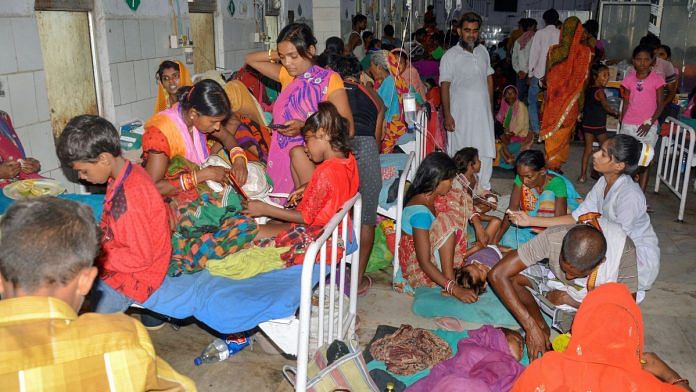The fault is in the measure
T Sundararaman | Professor at the School of Health Systems Studies, TISS
The Times of India
T Sundararaman discusses problems with NITI Aayog’s health index. He argues that the index uses a single set of indicators for comparison across all states without accounting for differences in their socio-economic contexts. He also adds that there is often a mismatch between “central designs and what the states need”.
Another problem, he notes, is that “key health outcomes are largely attributable to social determinants,” and the health sector performance contributes only partially to many improved health outcomes. The index, he suggests, also suffers from a data reliability problem as many of its components are based on self-reporting by the states.
He argues that a better approach would have been if a central team had discussed with states “their priorities on what should be measured” based on their respective development levels.
Justice, law and change
Manish Sabharwal | The writer is with Teamlease Services and serves as a director on the RBI board
The Indian Express
Manish Sabharwal argues that intervention of courts is “enabling frequent violations of the 270-day bankruptcy IBC deadline”. This, he says, leads to a situation where possible restructurings such as that of Jet Airways can end up as probable liquidation process. Comparing bankruptcy with a ice cream, he says “the more you wait, the more it melts”. He terms liquidation the worst possible bankruptcy outcome.
He also says that while any new law is refined by litigation, courts should not decide when lenders can make bad loan provisions nor should they influence the relative ordering of unsecured and secured creditors. He notes that banks entail huge costs when they are not able to accept thousands of crores from stressed company buyers even after 700 days of IBC filing.
India must make the most of the US-China trade war to advance its international agenda
Atman Trivedi | Managing director at Hills & Company, International Consultants, and adjunct fellow at the Pacific Forum
Hindustan Times
In this piece, Atman Trivedi highlights the meltdown of India-US trade ties. He suggests that with India’s growth and employment situation not particularly good, it should try to seek some “middle ground” with the US, instead of thinking that President Trump can be “placated by promises of more defence and energy purchases”.
He adds that all Asian nations which have risen to become middle-income countries and more, did so through good export performance. India should, therefore, adopt reforms that will enhance its competitiveness. These may include changes in land acquisition and labour laws, privatisation of banks, and better regulatory measures.”Such reforms present hard choices, but ones that can no longer be avoided,” adds the author.
A democratic requirement
Valerian Rodrigues | Taught political Science at Mangalore University and Jawaharlal Nehru University
The Hindu
Valerian Rodrigues urges the Opposition to reinvent itself as he believes it plays a pivotal role in a democracy. He provides a detailed account of the opposition’s role and evolution in post-colonial India’s parliamentary history. He notes how Jawaharlal Nehru was aware about the absence of an effective opposition in India’s parliament and had repeatedly asked Jayaprakash Narayan to lead the opposition.
Since the 1980s, the parliamentary opposition has been advancing one or the other form of nationalism – from the three competing ones. The first, he says, is a majoritarian version which wants to shun any special consideration to minorities. The second, a secular conception but which provides special considerations to different ways of life. And the third which argues for a tilt “in favour of the disadvantaged”.
He says that while the first version “has been triumphal today,” we cannot say that the others have lost their prominence.
Will Budget 2019 wave a magic wand to revive the economy?
Himanshu | Associate professor at Jawaharlal Nehru University
Mint
Himanshu writes about how the government, which has a big electoral mandate, is facing higher expectations from this year’s budget especially at a time when the economy is facing many challenges.
He points out that despite the various arguments around GDP growth numbers, there is no doubt that India is headed towards a growth slowdown. India is also facing a deficient monsoon. At the same time, the fiscal space is “limited”.
Himanshu warns of three issues that have been troubling economic policy making – insufficient jobs, persistant agrarian crisis and rising inequality in Indian economy.
A raw deal for auditors
Ashok Mahindra | former senior partner of A F Ferguson & Co
Business Standard
Ashok Mahindra writes how auditing the ‘expectation gap’ – what public and other financial statement users perceive and what auditors perceive to be their responsibility – is getting ‘wider and wider’.
He writes on how this gap is further accentuated by the hard stance and attitude of regulatory bodies.
An audit cannot verify 100 per cent of all documents and balances, and cannot discover all types of frauds. The costs of verifying every transaction would be prohibitive.
He writes on how banning firms will be disruptive and adds that a new dangerous trend is emerging wherein regulators are bringing criminality into the picture.
Must all ministries be in Delhi?
Aman Kumar Singh | Former principal secretary to the government of Chhattisgarh
Economic Times
Aman Kumar Singh writes on how concentration of power in Delhi was once a necessity but now technological advancements have done away with the need for physical proximity between the political seat of power and the civil service which administers the country.
He argues that policymaking in a country as diverse as India could be much more effective and grounded in reality if the administration is where ‘real people’ reside.
It would also address the problem of overcrowded capitals and fruits of development remaining concentrated in one city. He questions why ministries such as the shipping and fisheries ministry should be in land-locked Delhi.



